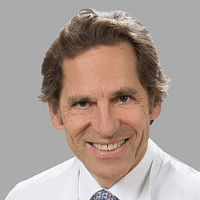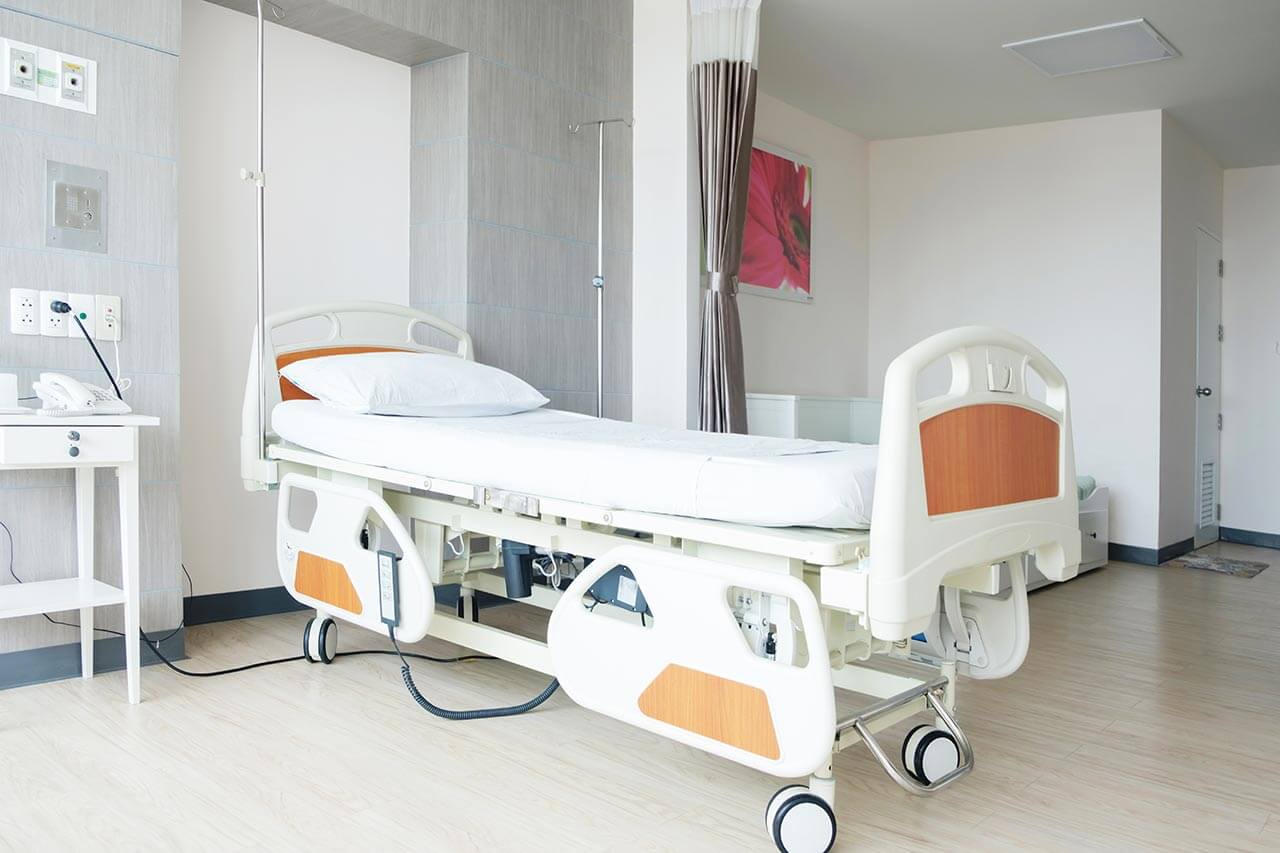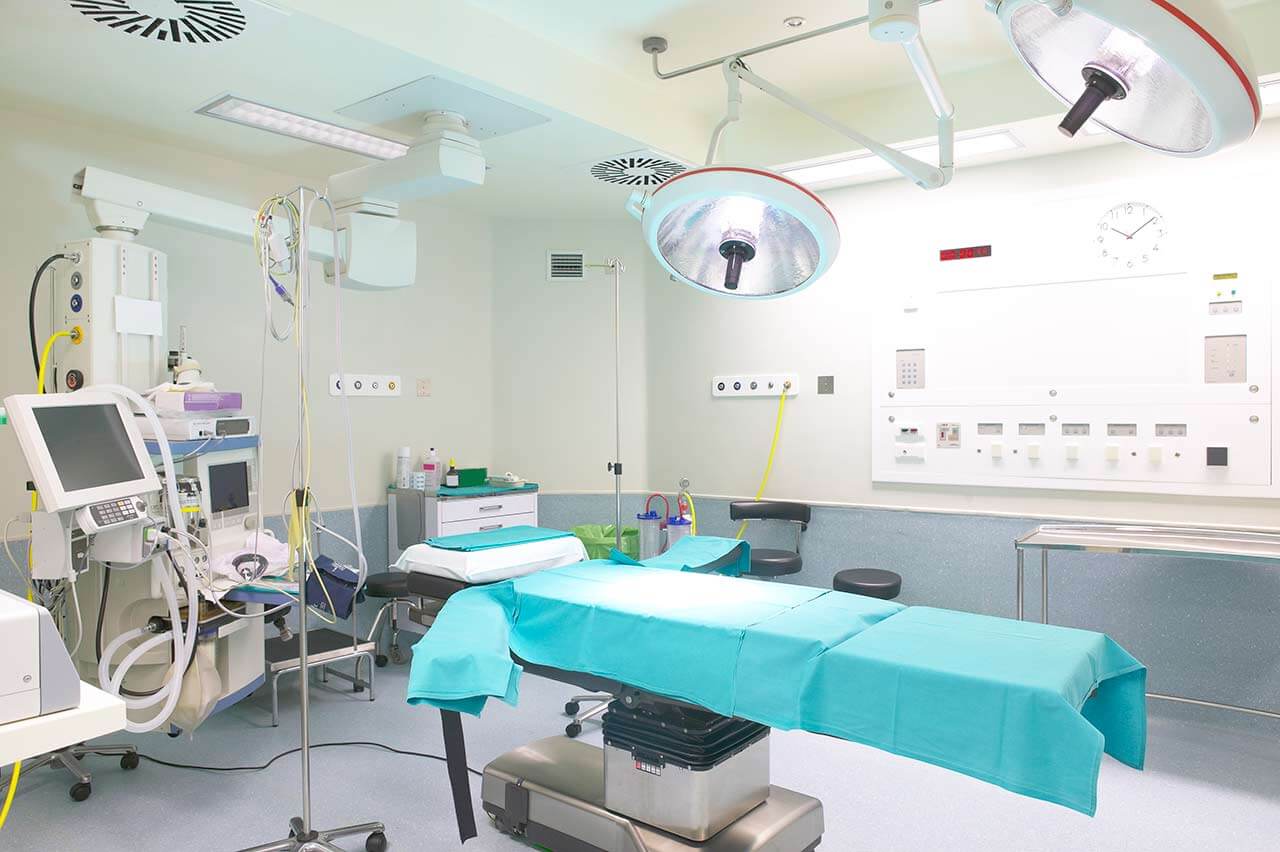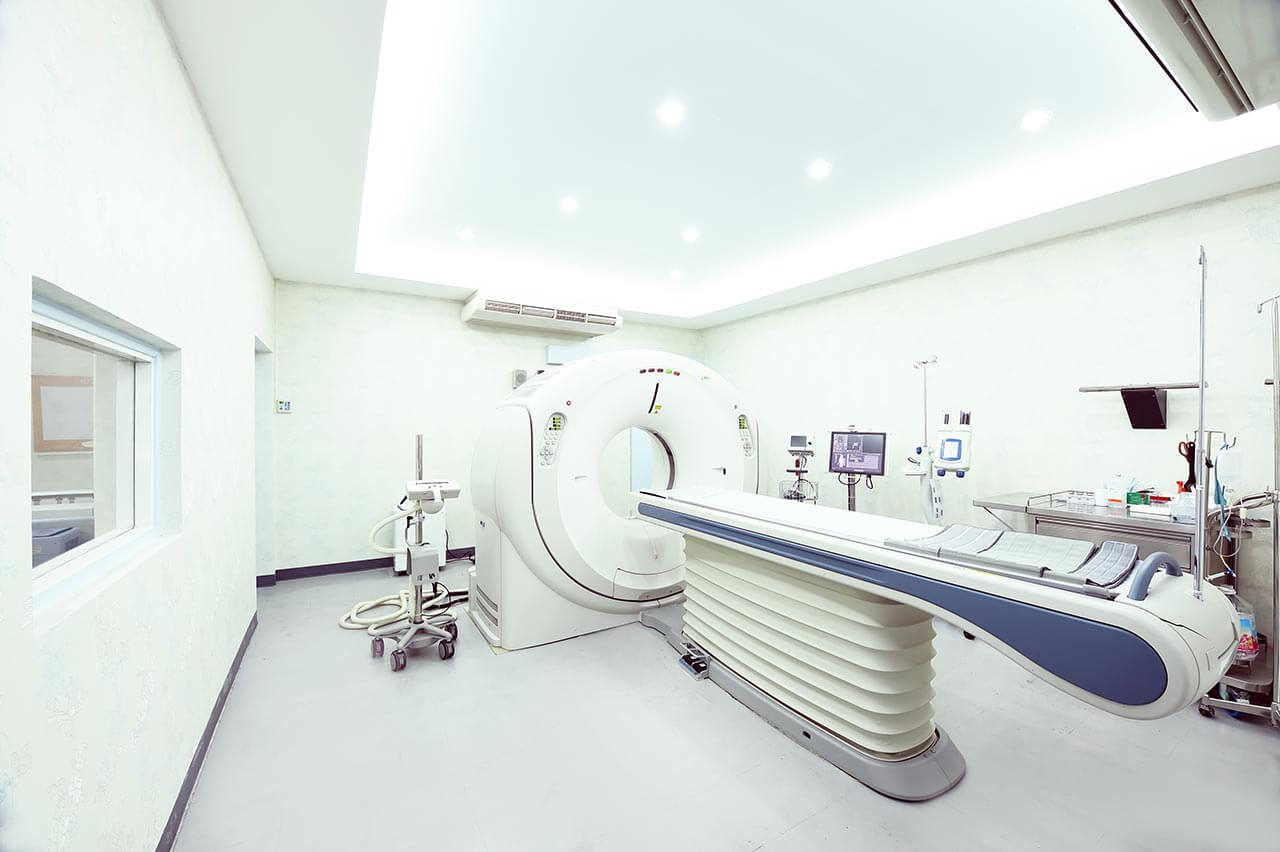
The program includes:
- Initial presentation in the clinic
- clinical history taking
- review of medical records
- physical examination
- urological examination
- laboratory tests:
- complete blood count
- general urine analysis
- biochemical analysis of blood
- inflammation indicators (CRP, ESR)
- indicators of blood coagulation
- tumor markers, PSA
- ultrasound scan of the urogenital system
- CT scan/MRI of the abdomen and pelvis
- preoperative care
- radical cystectomy and subsequent reconstruction
of the bladder with da Vinci robotic system - histological and immunohistochemical
examination of the removed tissues - symptomatic treatment
- control examinations
- the cost of essential medicines and materials
- nursing services
- full hospital accommodation
- explanation of future recommendations
How program is carried out
During the first visit, the physician will conduct a clinical examination and go through the results of the available diagnostic tests. After that, you will undergo the necessary additional examination, such as the assessment of liver and kidney function, ultrasound scan of the genitourinary system, CT scan and MRI. Based on the results of an additional examination, the physician will clarify the stage of the oncological process, choose the surgical technique and the type of anesthesia.
Surgery with the da Vinci robot starts with general anesthesia. After anesthesia, the surgeon makes small incisions on the anterior abdominal wall, through which he inserts the da Vinci robot manipulators and a video camera into the abdominal cavity. With the help of manipulators, the doctor dissects the ligamentous apparatus of the bladder and removes it. After that the doctor forms a new bladder from a part of the small intestine. The video camera continuously transmits a three-dimensional image of the surgical area in 12-fold magnification to the monitor. The surgeon installs drainage into the abdominal cavity and finishes the operation.
After tumor removal and forming a new bladder with the da Vinci robotic system, you will urinate naturally, through the urethra. The process of urination in this case will occur due to the work of the abdominal muscles.
After the completion of the operation, you will be transferred back to the ward, under the supervision of the attending physician and nursing staff. Due to the minimal invasiveness of the operation and the short duration of general anesthesia, you will not need to stay in the intensive care unit for a long time.
Finally, the attending physician will evaluate the results of control examinations, schedule the date of discharge from the hospital and give you detailed recommendations for further follow-up and treatment.
Service
You may also book:
 BookingHealth Price from:
BookingHealth Price from:
About the department
According to the famous Focus magazine, the Department of Adult and Pediatric Urology, Andrology at the St. Antonius Hospital Eschweiler ranks among the best German medical facilities specializing in prostate cancer treatment!
The department's urologists carry out modern diagnostics and treatment of all congenital and acquired diseases of the genitourinary tract, as well as of male genital organs. The department is certified as a Prostate Cancer Center and offers highly effective treatment of this pathology using the latest medical advances. The department's specialists also have unique experience in the treatment of benign and malignant tumors of the kidneys and bladder. In the field of pediatric urology, special attention is paid to the correction of congenital malformations of the genitourinary tract in young patients. The department's range of services is complemented by the diagnostics and treatment of male infertility, testosterone deficiency syndrome and erectile dysfunction. The medical facility enjoys an excellent reputation in its area of expertise throughout Germany. The doctors working in the department take care of both high quality of medical care and the maximum comfort of the patient during treatment, surrounding him with care and devoting enough time to personal communication. The department is headed by Prof. Dr. med. Joachim Steffens.
The department's medical team is proud of its achievements in the treatment of prostate cancer, which is the most common urological disorder in men. In 2007, the department was one of the first in Germany to receive a certificate from the German Cancer Society, confirming its exceptional competence in the field of prostate cancer therapy. Cancer treatment is a complex clinical task and requires the involvement of various specialists. Therefore, urologists work closely with oncologists, radiologists, radiation therapists and other specialists. After the initial consultation and studying the patient's medical history, the attending physician appoints a set of diagnostic studies to assess the condition of the prostate gland. The very first diagnostic examinations are a PSA test, digital rectal examination of the prostate and transrectal ultrasound. The following diagnostic examinations include imaging studies (CT, MRI) and biopsy. Should prostate cancer be confirmed, the department's specialists develop an optimal treatment regimen. In most cases, surgical resection of the tumor is the basis of therapy. In advanced stages of cancer, doctors often perform radical prostatectomy, which involves the removal of not only the neoplasm, but also of the entire prostate. Nevertheless, doctors always strive to choose the most sparing complex of therapeutic measures that will allow them to achieve a good result, but at the same time do without radical measures. The surgical treatment is complemented by chemotherapy, radiation therapy, including low dose-rate and high dose-rate brachytherapy, hormonal therapy and maintenance therapy. After completing the basic course of treatment, the patient can undergo a rehabilitation program to restore urinary function and improve his general health.
The treatment of bladder, kidney and testicular cancers is also within the competence of the department's doctors. As in the case of prostate cancer, the treatment tactics are developed jointly by the specialists in related medical fields, due to which all important clinical aspects are taken into account. To successfully treat these oncological diseases, the patient needs an operation to remove the tumor. The first-line surgical treatment is an organ-sparing operation, which involves the resection of a malignant neoplasm. If the cancer is at an advanced stage, radical surgery with the removal of a part or all of the organ is often required. The surgical treatment is always complemented by such conservative methods as chemotherapy, radiation therapy, hormonal therapy, etc.
In the field of andrology, the treatment of male infertility, testosterone deficiency syndrome and erectile dysfunction is of particular interest. The patients with erectile dysfunction undergo comprehensive diagnostics and conservative treatment. Should infertility be suspected, andrologists will study the patient's medical history, conduct a clinical examination, ultrasound examinations, ejaculate examination and assess sperm quality, endocrine profile. Men with infertility receive drug treatment. In complex clinical cases, doctors perform surgical sperm collection for subsequent artificial insemination (testicular sperm extraction, including microsurgical one, and microsurgical epididymal sperm aspiration). If the patient suffers from testosterone deficiency syndrome, hormonal imbalance will be normalized using hormone replacement therapy.
An integral part of the clinical practice of the medical facility is both conservative and surgical treatment of urological diseases in children. The department mostly performs corrective and reconstructive surgery for congenital malformations, for example, hypospadias, cryptorchidism, urethral stenosis, vesicoureteral reflux. Many children are admitted to the department with urinary incontinence and recurrent urinary tract infections. These diseases are treated in young patients with conservative methods. Urinary incontinence is successfully treated using laser acupuncture. The therapeutic procedure is absolutely painless and does not cause any side effects.
The department's range of medical services includes:
- Diagnostics and treatment of prostate cancer
- Surgical treatment
- Nerve-sparing radical prostatectomy
- Radical extended prostatectomy in case of advanced stages of cancer
- Radical prostatectomy for cancer progression after radiation therapy
- Transurethral resection of the prostate
- Conservative treatment
- Chemotherapy
- Radiation therapy, including low dose-rate and high dose-rate brachytherapy (a radiation source is placed directly into the pathological focus)
- Hormonal therapy
- Maintenance therapy
- Surgical treatment
- Diagnostics and treatment of bladder cancer
- Surgical treatment
- Transurethral resection of bladder tumor
- Nerve-sparing radical cystectomy
- Reconstructive surgery to form a new bladder after its resection (for example, from ileal tissue)
- Conservative treatment
- Laser ablation of tumors in the upper urinary tract
- Chemotherapy
- Radiation therapy
- Maintenance therapy
- Surgical treatment
- Diagnostics and treatment of kidney cancer
- Surgical treatment
- Open and laparoscopic radical nephrectomy
- Radical nephroureterectomy
- Organ-preserving surgery for kidney tumor resection
- Conservative treatment
- Chemotherapy
- Radiation therapy
- Maintenance therapy
- Surgical treatment
- Diagnostics and treatment of testicular cancer
- Surgical treatment
- Radical testicular removal surgery
- Organ-preserving surgery for testicular tumor resection
- Retroperitoneal (post-chemotherapeutic) nerve-sparing lymphadenectomy
- Conservative treatment
- Chemotherapy
- Radiation therapy
- Maintenance therapy
- Surgical treatment
- Diagnostics and treatment of kidney stone disease
- Flexible and rigid ureterorenoscopy
- Percutaneous nephrolitholapaxy with pneumatic, electrohydraulic, or laser lithotripsy
- Extracorporeal shock wave lithotripsy
- Diagnostics and treatment of urinary incontinence in men and women, pelvic organ prolapse in women
- Surgical treatment
- Reconstructive surgery (for example, Burch procedure, sacrocolpopexy), uterine-sparing pelvic floor reconstruction
- Minimally invasive and laparoscopic procedures (for example, laparoscopic supracervical hysterectomy, total laparoscopic hysterectomy, laparoscopic rectopexy)
- TOT and TVT sling procedures
- Filler and botulinum toxin injections
- Bladder stimulator implantation
- Surgical methods of urine diversion (temporary and lifelong)
- Conservative treatment
- Drug therapy (for example, anticholinergic drugs, hormonal drugs)
- Therapeutic exercises to strengthen the pelvic floor muscles, biofeedback, electrical stimulation
- Pessary treatment
- Radiofrequency therapy
- Surgical treatment
- Diagnostics and treatment of andrological diseases
- Surgical treatment
- Testicular sperm extraction, including microsurgical one, and microsurgical epididymal sperm aspiration in case of infertility
- Conservative treatment
- Drug treatment for for erectile dysfunction
- Replacement therapy for testosterone deficiency syndrome
- Drug treatment for male infertility
- Surgical treatment
- Diagnostics and treatment of urological diseases in children
- Surgical treatment
- Corrective and reconstructive surgery for congenital malformations of the urinary system and genitals in boys (hypospadias, cryptorchidism, urethral stenosis, vesicoureteral reflux)
- Conservative treatment
- Conservative treatment of urinary incontinence and recurrent urinary tract infections, including acupuncture for urinary incontinence
- Surgical treatment
- Diagnostics and treatment of other pathologies of the urinary system and genitals in men
Curriculum vitae
Higher Education and Professional Career
- 1984 Doctoral thesis defense in Medicine.
- 1989 Board certification in Urology.
- 1989 Member of the International Society of Urology.
- 1990 Scientific Award in Experimental Urology.
- 1992 Habilitation.
- 1992 Member of the European Board of Urology.
- 1995 Urology Innovation Award.
- 1995 Optional training in Special Urological Surgery.
- 1996 Chief Physician of the Department of Adult and Pediatric Urology, Andrology at the St. Antonius Hospital Eschweiler.
- 1998 Corresponding Member of the American Urological Association.
- 1998 Extraordinary Professorship.
- 2001 - 2008 Member of the Presidium of the Professional Association of German Urologists.
- 2004 - 2010 Chairman of the Working Group of the Chief Physicians of the Professional Association of German Urologists.
- 2006 Additional qualification in Andrology.
- 2007 Additional qualification in the field of drug tumor treatment and permission to conduct advanced training courses in this area.
- 2007 Head of the Prostate Cancer Center at the St. Antonius Hospital Eschweiler.
- 2008 - 2010 Vice President of the German Society of Urology (DGU).
- 2010 - 2011 President of the German Society of Urology (DGU).
- Since 2012 Founding Member and Board Member of the Academy of German Urologists, as well as Head of advanced training courses.
- 2013 Member of the European Examination Board (Brussels, Warsaw).
- 2013 Video Award from the German Society of Urology, Co-Author of the Scientific Work.
- Since 2014 Deputy Chairman of the Junior Academy of the German Society of Urology.
- 2014 Video Award from the German Society of Urology.
- 2014 Alexander von Lichtenberg Award for the interdisciplinary work of the Prostate Cancer Center certified by the German Cancer Society (distinction for excellent treatment results).
- 2016 Advanced training to become a participant in the "Quality Medicine Initiative" (IQM) in cooperation with the Medical Association of Berlin.
- 2017 Award of the Society of Urology of North Rhine-Westphalia for the best video "A step-by-step guide to surgery for beginners" and scientific video "Semi-rigid ureterorenoscopy".
- 2017 Founding Member of the Working Group "Young Urologists" of the German Society of Urology.
- 2018 Co-Editor of "Urologist" of the German Society of Urology.
- Since 2018 Medical Consultant in Patient Education with Electronic Media.
- 2019 Editor of the 9th scientific book published by Springer.
Photo of the doctor: (c) St.-Antonius-Hospital
About hospital
According to the prestigious Focus magazine, the St. Antonius Hospital Eschweiler ranks among the top medical facilities in North Rhine-Westphalia!
The hospital is a modern medical complex with 13 specialized departments. The hospital has more than 165 years of history, so it has long won an excellent reputation not only in Germany, but also in the European medical arena. In addition, the medical facility has the status of the Academic Hospital of the RWTH Aachen University, thanks to which it can offer patients the very latest and unique medical advances. The highly qualified medical staff of the hospital, consisting of more than 1,300 employees, is focused on high-quality medical services with due consideration of the personal needs and wishes of patients
The medical complex has 443 beds. More than 15,000 inpatients undergo diagnostics and treatment on an inpatient basis, while about 25,000 patients receive ambulatory medical care. The specialists of the hospital often provide diagnostic services and treatment to the patients from foreign countries.
The main areas of clinical practice of the medical facility include oncology, hematology, general and abdominal surgery, plastic surgery, hand surgery, vascular surgery, internal medicine, gynecology, urology and radiation oncology. Each area is represented by an experienced team of doctors and specially trained nursing staff, whose task is to provide the accurate diagnostics and the most effective treatment. The work of the medical staff is based on the use of modern technical resources, as well as classic and innovative treatment methods. The doctors from different medical specialties cooperate closely with each other, so the slightest details and characteristics of the patient's body are taken into account when planning and providing treatment. In addition, the medical staff is always open to personal communication with the patients, strives for their moral support on their way to recovery and surrounds them with care.
The outstanding achievements of the hospital and high treatment success rates are confirmed by the quality certificates of the German Cancer Society, the German Cardiac Society, the German Society of Vascular Surgery, the German Society of Hematology and Medical Oncology and the German Trauma Society. In addition, according to the famous Focus magazine, the hospital is recognized as one of the best medical centers in Germany specializing in the treatment of breast cancer, prostate cancer and cardiovascular diseases.
Photo: (с) depositphotos
Accommodation in hospital
Patients rooms
The patients of the St. Antonius Hospital Eschweiler live in cozy and light rooms. All the patient rooms are well equipped to make the patient feel as comfortable as possible throughout the entire period of hospital stay. The patient room includes an automatically adjustable bed, a bedside table, a wardrobe, a TV and a telephone. Each patient room has an ensuite bathroom with shower and toilet. Some patient rooms have specially designed bathrooms for disabled people. The patient rooms also have Wi-Fi.
If desired, the patient with his accompanying person can live in the enhanced comfort room. These patient rooms are additionally equipped with upholstered furniture, a mini fridge and a safe for storing valuables.
Meals and Menus
The patient and his accompanying person are offered tasty and healthy three meals a day: breakfast, lunch and dinner. Breakfast and dinner are served buffet style, while for lunch there is a choice of three set menus. If for some reason you do not eat all the foods, you will be offered an individual menu.
The hospital also has a cozy cafe with a large choice of salads, main courses, pizza, cakes and ice cream. Here you can enjoy aromatic coffee, delicious tea or soft drinks.
Further details
Standard rooms include:
Religion
The religious services are available upon request.
Accompanying person
During the inpatient program, the accompanying person can live with the patient in a patient room or a hotel of his choice. Our managers will help you choose the most suitable option.
Hotel
During the outpatient program, the patient can stay at the hotel of his choice. Our managers will help you choose the most suitable option.




